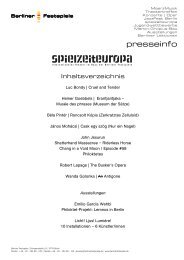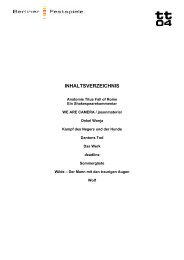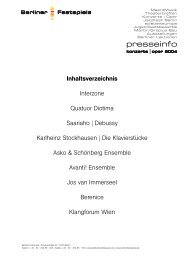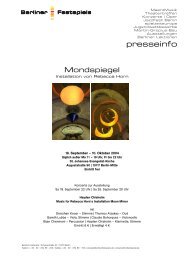Alle machen mit. Die meisten wissen's nicht - Berliner Festspiele
Alle machen mit. Die meisten wissen's nicht - Berliner Festspiele
Alle machen mit. Die meisten wissen's nicht - Berliner Festspiele
Sie wollen auch ein ePaper? Erhöhen Sie die Reichweite Ihrer Titel.
YUMPU macht aus Druck-PDFs automatisch weboptimierte ePaper, die Google liebt.
Ruhrtriennale - Les Ballets C de la B - L'opéra National de Paris<br />
Alain Platel/Sylvain Cambreling<br />
WOLF<br />
Several years ago, following the worldwide success of productions such as<br />
<strong>Alle</strong>maal Indiaan, La Tristeza Complice, Bernadetje or Iets op Bach, when<br />
the Ghent director Alain Platel announced that he intended to bring his directing<br />
career to an end, he had not reckoned with that other famous citizen of Ghent,<br />
Gerard Mortier. Mortier wanted to use his time in the old Ruhr industrial area to<br />
revive the opera by moving lt from tradition-laden establishments into rough<br />
industrial halls, by taking it out of the hands of the privileged (economic) elite and<br />
offering it to an audience of Shalke 04 supporters. And Platel appeared to him to be<br />
the perfect intermediary between the traditionally clearly distinct high and low<br />
cultures.<br />
Initially, Platel had no feeling for Mozart whatsoever. Still, he accepted Mortier's<br />
idea of working with his music. He overcame his resistance and 1 ooked for moving<br />
melodies, for canons t hat make one smile or music that is so popular that anyone<br />
can unthinkingly whistle along with it. The scores were arranged by Sylvain<br />
Cambreling for an ensemble made up of 19 musicians from the Vienna Klangforum<br />
who are not averse to such incongruous elements as the harmonica and marimba.<br />
Three female singers (1 coloratura, 1 soprano, 1 mezzosoprano) take care of the<br />
vocal parts.<br />
Platel invariably puts the whole world on stage. And this piece is no exception:<br />
dancers and performers from all corners of the world appear: from Vietnam, via<br />
Burkina Faso to Brazil. This mix is the point of departure and they all bring with<br />
them their past, their stories, their dreams. These are the materials for a<br />
performance which gradually takes shape through improvisation and which, in this<br />
instance, develops on the basis of the antithesis between virtuosity and banality. An<br />
antithesis that was also at work in Mozart's life.<br />
But there is more going on in Wolf. Two deaf players have joined the team. What<br />
does Mozart represent for them? How does one cope in this world if one does not<br />
speak? In addition to this, the stage is home to a pack of dogs, a kind of<br />
uncontrollable and constantly present subconscious, sometimes sleeping drowsily,<br />
at other times surprisingly menacing. Many of the conventions of the stage are<br />
thereby disregarded. But it makes the performance all the more real.<br />
Hildegard De Vuyst








